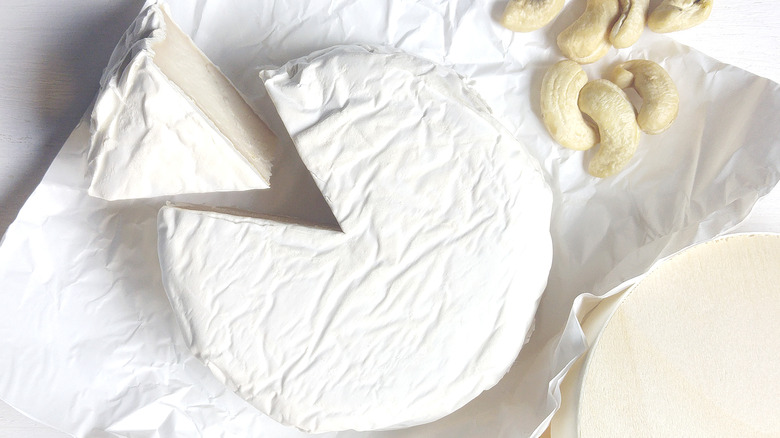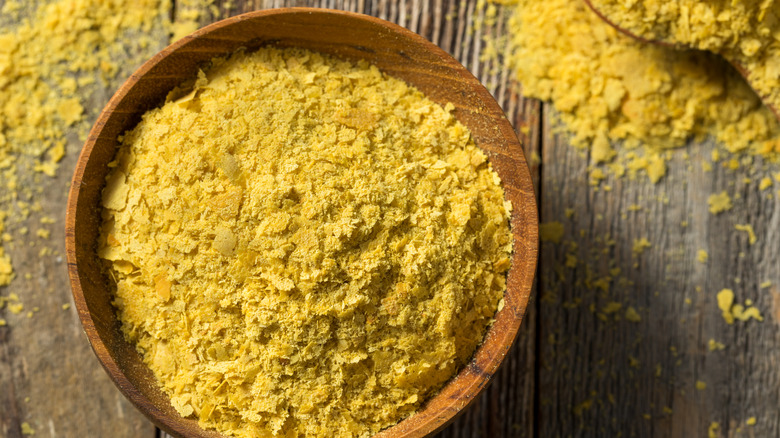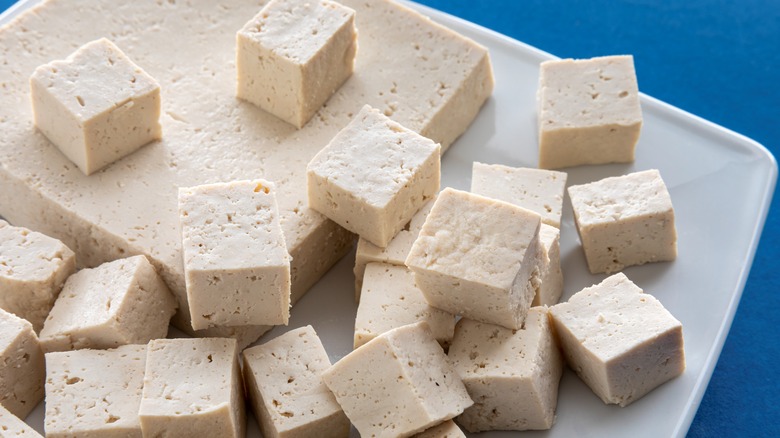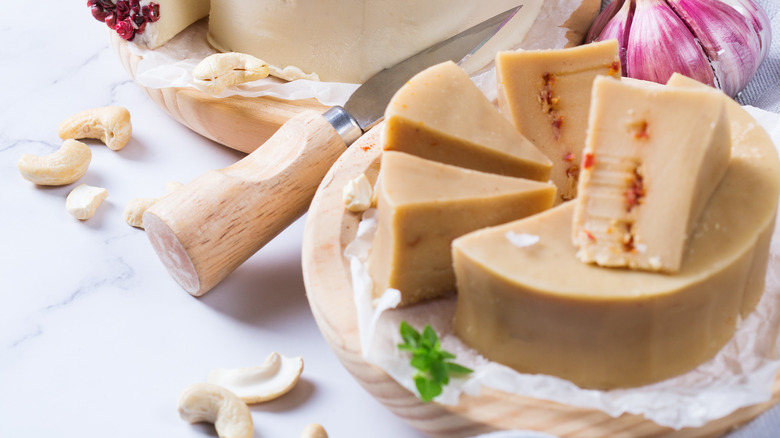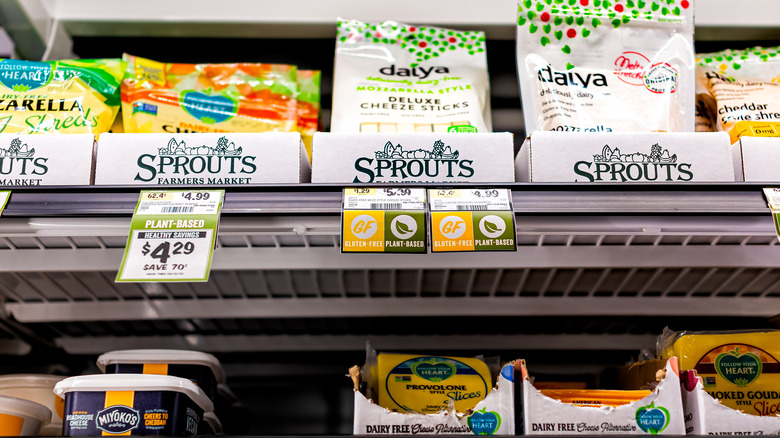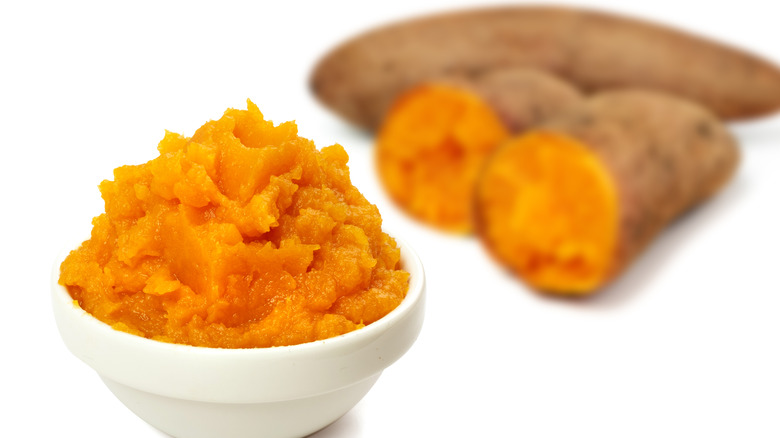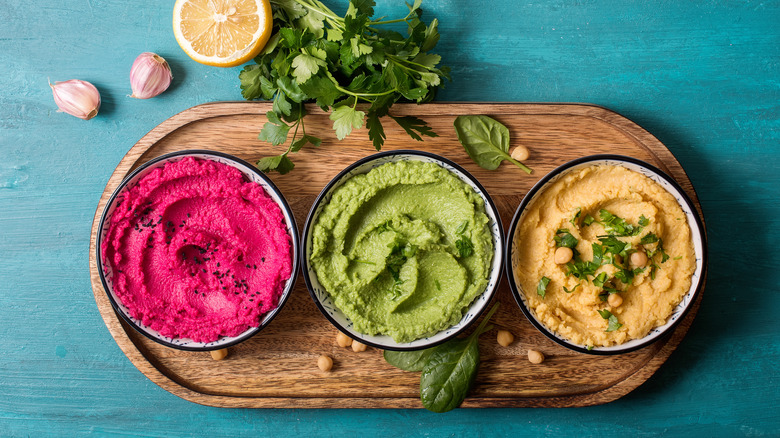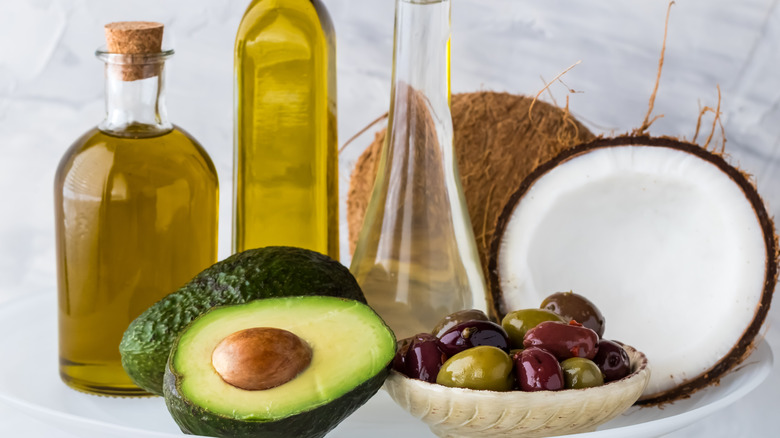8 Best Dairy-Free Cheese Alternatives
There are an ever-increasing number of creative ways to get that creamy, cheesy kick without the dairy. That's hardly surprising given that more and more people these days are eschewing cheese — by the age of 20, about 30 millionchem Americans are lactose intolerant. Adding to that, it's estimated that as of 2019, around 9.7 million Americans have become vegan (via Ipsos Retail Performance). That said, the market for dairy-free cheese alternatives is booming, as are the options for making your own substitute.
Of course, the important question is: Does dairy-free cheese taste any good, or is it just a poor facsimile of the "real" stuff? With a resounding yes, we can assure you that dairy-free cheese alternatives taste great. The key thing to remember here is we're talking about alternatives. Though some do, most won't taste exactly like dairy cheese — yet they will satisfy that particular craving. And, you'll likely come across some new favorites, even if you still eat dairy. Fortunately, whether you can't have cheese or just choose not to, there are loads of dairy-free cheese alternatives out there today. And you're in luck, as we can show you what to look for.
Use nutritional yeast
Nutritional yeast is a classic dairy-free cheese alternative many vegans lovingly refer to as "nooch." While it may seem unlikely that this yellow powder could replace dairy cheese, it truly does pack a cheesy kick. In fact, nutritional yeast plays an integral part in many of the other items on this list of the absolute best dairy-free cheese alternatives. As the Umami Information Center reports, the all-important fifth flavor of umami — which is one of the endearing attributes of cheese — derives from a protein called glutamate, which is naturally occurring within nutritional yeast (via The New York Times).
But what is nutritional yeast? It's deactivated yeast that is fed and grown on molasses before being dried and pasteurized. Not only is this flaky seasoning delicious, but it's also super nutritious as it is packed with B vitamins, protein, and iron. How do you use nooch? It's a great popcorn topping, added into salad dressings and soups, or in any dairy-less cheese sauce. If you'd like to sprinkle it on your pasta, try making our cashew ricotta vegan cheese recipe, which consists of blended-up cashews, nutritional yeast, garlic powder, and salt. It also goes great on this totally vegan eggplant parmesan recipe.
Bonus tip: If you don't eat eggs, nutritional yeast also works as a great substitute, along with Indian black salt, as an ingredient that will change your vegan recipes for tofu scramble and other egg-based dishes. Or, add a pinch to vegan desserts that are normally egg heavy, such as flan.
Work with tofu
Of all the things you need to know about tofu, the most relevant to our purposes here is that tofu is curdled soy milk. So, it makes perfect sense that it's a great dairy-free alternative to cheese. In fact, you might even call it the original vegan cheese. Its neutral flavor and texture resemble feta or paneer, making it an ideal choice to use in various cheesy dishes. Tofu is a wonderful ingredient, a blank canvas, a flavor sponge that soaks up whatever tastes you'd like to impart.
Use cubes of tofu in place of cheese in our simple palak paneer recipe (you'll probably want to swap out the Greek yogurt for dairy-free yogurt, too). If you're in the mood for Italian, why not try using tofu instead of ricotta in your next lasagna? You can do a 1:1 exchange if you're pressed for time, but mixing in lemon juice, salt, sugar, and herbs will help mimic the flavor of dairy ricotta even more (via VegNews).
Now, there are many different types of tofu, and when you're using tofu to replace cheeses such as paneer, ricotta, or feta, opt for a firm texture. The secret to making your tofu extra crispy is pressing it, a technique that removes any excess water from the block. Without frying, this will also go a long way to ensuring tofu's place as one of the best dairy-free cheese alternatives. However, you can cook it for a shot at some vegan mozzarella bites.
Almond alternatives
Considering how many kinds of nut milk are on the market, the popularity of nut cheese will likely come as no surprise to you. In fact, many people make nut cheese with the leftover pulp from their homemade almond milk (via Academy of Culinary Nutrition). Almonds — and macadamia nuts — are also popular choices for dairy-free cheese that work particularly well in fermented applications.
Since almonds are drier nuts, it's hard to get them perfectly smooth in your own kitchen. That's why they work really well in homemade baked fetas, cheese spreads, or ricotta. Make sure to soak your almonds overnight before blending them with lemon and nutritional yeast, two ingredients that will help mimic the acidity and unctuous flavor of dairy cheese.
Almonds have the added benefit of being really good for you. Per Healthline, a small handful contains more than 30% of your daily recommended manganese and vitamin E intake. They're also rich in protein, fiber, magnesium, and monounsaturated fats. So, if you want a nutritious and delicious dairy-free cheese snack, why not try almond cheese?
Go (cashew) nuts
Cashews are one of the most versatile nuts out there when it comes to dairy-free cooking. After being soaked, you can blend cashews ridiculously smooth in even the most average blenders. Because of this consistency, cashews are texturally great in cheese-free sauces. Given that Healthline reports that they are filled with nutritional benefits, this swap also has a high potential to feel good for your body. Additionally, research shows that many varieties of cashews are high in glutamic acid, which is a derivative of that umami-developing protein, glutamate. So, cashews also make a great dairy-free alternative when it comes to flavor.
Nut cheeses are very simple to make at home, but they're also becoming more readily available in supermarkets. To make this vegan cashew cheese recipe, all you need to do is soak your nuts for at least half an hour. Drain the water and then blend them with nutritional yeast, lemon juice, water, salt, and some spices. Bonus tip: if you don't have a high-powered blender, try soaking your cashews overnight. In general, the longer they soak, the softer they will become.
Nut cheeses are great in recipes but also as part of any cheese platter or charcuterie board. If you're looking for a dairy-free cheese that isn't very processed, nut cheeses may be for you! (If you have a nut allergy, sunflower seeds work well in plant-based cheeses, but be aware they do leave a greenish tinge behind.)
Purchase ready-made
Speaking of the supermarket, dairy-free cheeses are more widely available than ever. But store-bought vegan cheese isn't a recent invention by any means. We weren't kidding when we said tofu is the original vegan cheese. A report by the Soy Info Center titled History of Fermented Tofu: A Healthy Non-Dairy/Vegan Cheese (1610-2011) states that fermented tofu is the predecessor to today's more processed products. Moreover, the report suggests that the first recorded sale of fermented tofu as a piece of cheese was in France in 1882.
While we think tofu is one of the best plant-based cheese choices, people want options. They want that ooey-gooey, melts on your pizza, pulls when you slice your grilled cheese, kind of deal. And dairy-free options are constantly fighting against the idea that vegan cheese doesn't melt like regular cheese. Luckily, there are now so many brands and flavors available to mitigate this. Vegan.com has a comprehensive list of all available vegan cheese brands on the market. Whether you want cream cheese, mozzarella, pepper jack, or halloumi, there truly is something for everyone these days.
If you want to achieve this texture at home, all is not lost. The secret to that stretch in homemade dairy-free cheese is tapioca starch. In a pinch, arrowroot powder and Xanthan gum will also work, according to the folks over on Reddit/vegancheesemaking. A word of caution: Since some lactose-free cheeses contain casein, which is a milk protein, they're not actually vegan (per Healthline). Even more strangely, some vegan changes aren't dairy-free. According to VegNews, food scientists have managed to make plant-based whey identical to that derived from cows' milk. With that in mind, read food packaging carefully to ensure what you're buying fits your dietary needs.
Use more vegetables
It's no secret that a vegan or plant-based diet is an easy way to increase your vegetable intake, but did you know you can turn veggies into dairy-free cheese? These options are often the best dairy-free cheese alternative if you're looking for something lower in fat and calories and higher in vitamins A and C. Some common hacks include carrots and potatoes, like in our all-purpose vegan cheese recipe. Consider using this sauce for nachos or mac and cheese. And while most people are familiar with sweet potatoes as an alternative to regular spuds — did you know they're a great cheese alternative, too?
Sweet potatoes are another common vegetable base for dairy-free cheese since they've already got that orange cheddary color. To make a yummy mac and cheese using sweet potatoes, all you have to do is mix some mashed sweet potatoes with some oil, flour, plant milk, and seasonings. Mix the sauce on the stove until it's thick and smooth, and then toss it with your noodles (via The Washington Post).
If you're looking for something you can sink your teeth into, zucchini cheese might be up your alley. This dairy-free alternative to cheese is also soy and nut-free, so it'll work for various diets. You only need zucchini, coconut oil, lemon juice, salt, and gelatin or agar-agar (via Gutsy by Nature).
Replace cheese with dips and spreads
Whether you're the person who doesn't do dairy or you unexpectedly find yourself with a guest who doesn't, suddenly ending up in a dairy-swap emergency is bound to happen to all of us at one time or another. So, what can you do if you have no time to whip up some vegan cheese or run to the grocery store? We suggest you turn to your appetizer table.
Creamy dips and spreads make wonderful dairy-free alternatives for cheese because they mimic its unctuous mouthfeel. Therefore, if you need a quick vegan topper for your burger or sandwich, guacamole, tahini sauce, or one of these hummus recipes will add that satisfying fatty element. If you've got the means to get a little more creative, you can turn your hummus into cheese by adding nutritional yeast. Then, use it in quesadillas or grilled cheese (via Melanie Cooks).
Not only do dips and spreads taste great as a dairy-free alternative to cheese, but they're also very cost-effective. Even if you can eat dairy — there is another reason to try some of these dips over dairy cheese. According to Healthline, cheese contains a lot of saturated fat, which has been found to increase people's cholesterol levels. So, if you're watching your cholesterol, your doctor may recommend you cut down on the cheese. Since saturated fat is mostly found in animal foods — and cholesterol is only found in animal foods — you won't have to worry when eating plant-based dips.
Use enough fat
Cheese is not a low-fat food, which is one of the reasons we love it, according to Insider. It stands to reason that if your goal is for a dairy-free alternative to taste as much like cheese as possible, then you need to use more fat when cooking. Fat is one secret to making vegan food delicious, per One Green Planet, so keep that in mind when you choose your dairy-free cheese or recipe.
You can easily recreate the taste and texture of dairy with nuts, olive or coconut oil, or plant-based butter. If you don't use these fats, your cheese won't come together, or it just won't taste that good. For example, many dairy-free cheese recipes call for coconut oil; don't skip this step. Bonus tip: Add a splash of acid to your fatty dairy-free cheese to emulate the fermented flavor of dairy.
Most vegetable oils are lower in saturated fats than animal fats are. And the type of fat you're eating matters more than you think, especially where heart health is concerned. The notable exception here is coconut oil, which isn't actually all that nutritious in terms of saturated fat. So, if saturated fat and cholesterol are important to you, bear this all in mind. And, if you're eating dairy-free because you're seeking something lower in calories, nutritional yeast as a flavoring is your best bet, though it won't have the texture or mouthfeel of dairy cheese.
